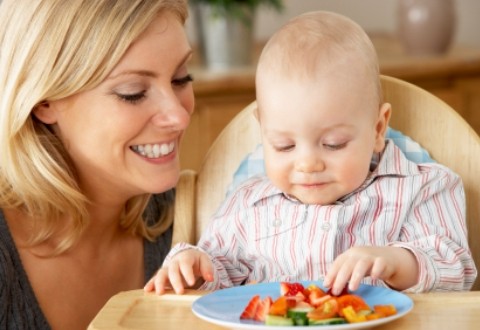Some babies do not get their first teeth until nine months or later, so foods need to be soft enough to mash with the gums alone. As such, one of the best finger foods to start with are ripe bananas cut into bite-sized pieces. Also look for finger food starters, made exclusively for baby, in your local supermarket or baby store. These food products are usually star or circular-shaped and dissolve easily, so there is no choking hazard. Other good foods to start on:
- O-shaped cereal
- small cheese cubes
- soft, cooked vegetables cut into pieces, such as green beans, carrots and potatoes
- soft, ripe fruits that have been diced, such as bananas, mangoes, watermelon or peaches
- cooked pasta that is cut into pieces
- meat or poultry that has been cooked until soft and cut into small pieces
- diced hard-boiled eggs
What foods should be avoided?

Some babies do not have enough teeth to properly chew certain foods, and others are just not developmentally ready for certain foods. Avoid giving your little one anything that is hard, chewy or in large pieces. Foods that pose a choking hazard include nuts, popcorn and other foods that would be difficult for your baby to chew. There are also some concerns over allergies and introducing foods at a young age. If there is a family history of allergies to a certain food or food group, avoid trying this one with your baby. It is also best to avoid peanut butter and honey.
How should I give my baby finger foods?
Always make sure the food is soft and cut into small pieces. Lay a few pieces down on your baby’s tray, and let him or her try each food. Some babies may dislike certain foods at first, but they will usually accept the food after several attempts. Babies can make quite a mess when they first start feeding themselves; however, you should let your little one explore the food until he or she is finished. Remember, letting your baby have time to try the new foods will help him or her develop eye-hand coordination and fine motor skills.